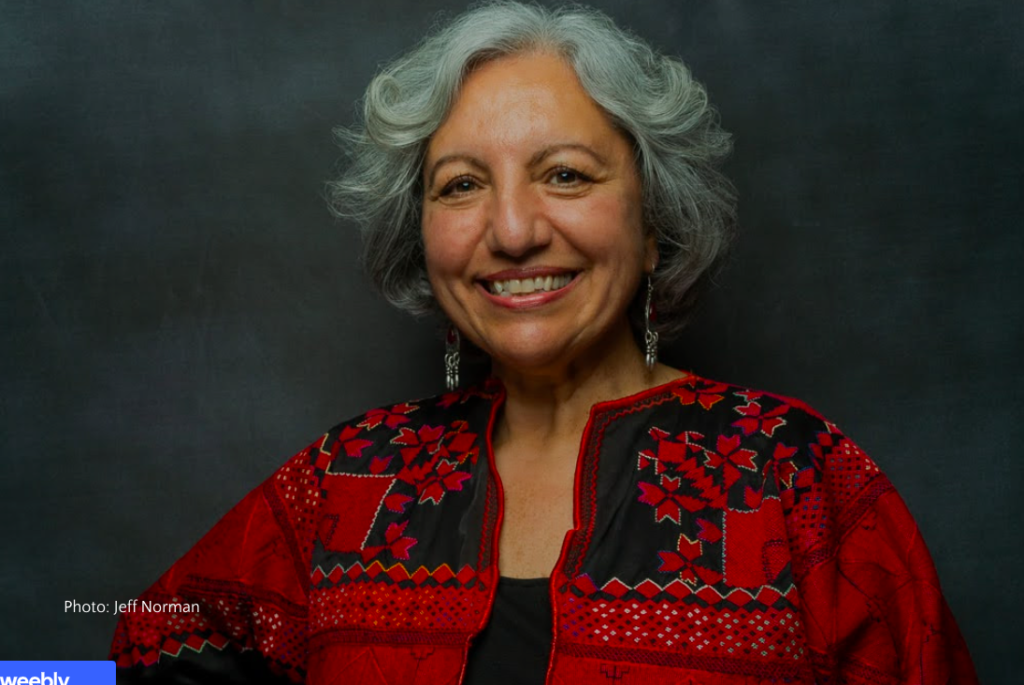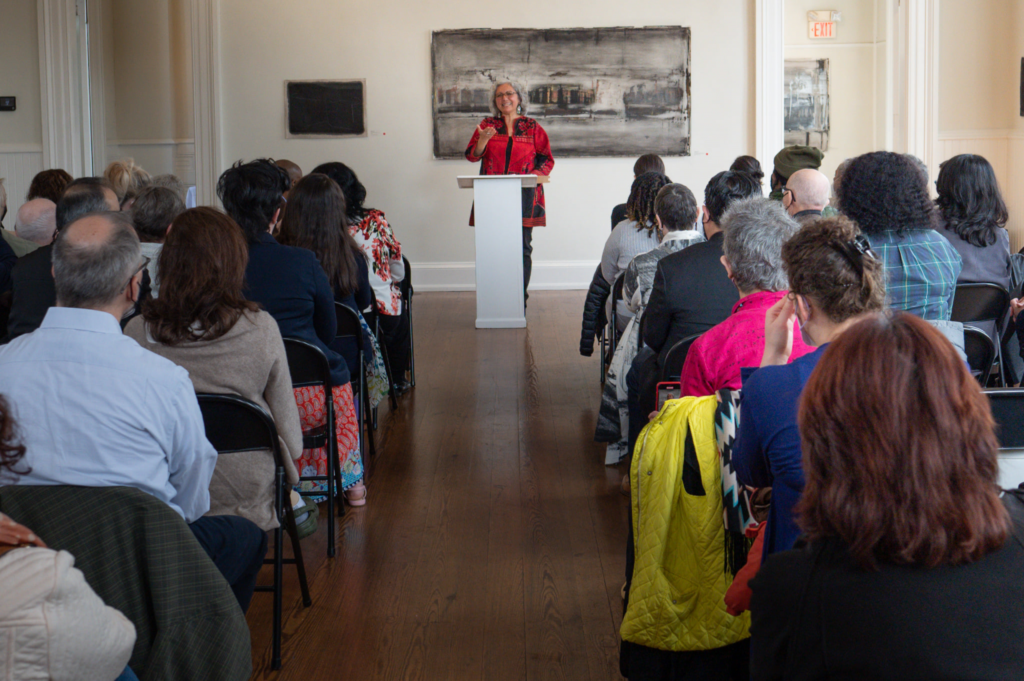Palestinian Cry from Gaza, ‘Write My Name,’ Goes Viral in Poem by Palestinian American

By John Mason / Arab America Contributing Writer
This is the story of a poem, “Write My Name,” by Palestinian American poet, Zeina Azzam. The poem has electrified many people across the world. It depicts the plight and pain of Palestinian civilians in Gaza, as a result of the Hamas-Israeli war. Much of this report is based on an email exchange between Zeina and the contributing writer. Since her writing is direct, expansive, and, at the same time, exquisite, I use her quotes liberally.
Palestinian American Poet, Zeina Azzam, immortalizes the Palestinian People’s pain and suffering inflicted by the Hamas-Israeli War
It began with CNN’s initial report: “Some parents in Gaza have resorted to writing their children’s names on their legs to help identify them should either they or the children be killed.” Palestinian American poet, Zeina Azzam, picked up on this news immediately. She wrote in an email exchange, “I read, and watched a few news clips, about this practice of parents in Gaza writing their children’s names on legs and arms so they can be identified in death. It was devastating to learn about it. I wrote this poem after I learned about this practice. And then I wanted to find a short quote, an epigraph, to put at the beginning of the poem to give it some context for the readers, and that’s how I found the CNN quote.”
Giving context to the deadly war, Zeina described, “Israeli airstrikes have killed entire families in Gaza, including generations of family members, as bombs explode and buildings collapse over their heads. Thousands of children are among the victims. That parents write names on their children’s legs so they are identified in death is a testament to their utter despair, to the horrors and injustice of this war on Gaza. It is an act of profound anguish, deep grief, and powerlessness. Palestinian parents don’t want their children to become mere statistics; at least in death, they can be named.”
Here is the full poem, “Write My Name,” originally published by Vox Populi:
Write my name on my leg, Mama
Use the black permanent marker
with the ink that doesn’t bleed
if it gets wet, the one that doesn’t melt
if it’s exposed to heat
Write my name on my leg, Mama
Make the lines thick and clear
Add your special flourishes
so I can take comfort in seeing
my mama’s handwriting when I go to sleep
Write my name on my leg, Mama
and on the legs of my sisters and brothers
This way we will belong together
This way we will be known
as your children
Write my name on my leg, Mama
and please write your name
and Baba’s name on your legs, too
so we will be remembered
as a family
Write my name on my leg, Mama
Don’t add any numbers
like when I was born or the address of our home
I don’t want the world to list me as a number
I have a name and I am not a numberZeina Azzam
Write my name on my leg, Mama
When the bomb hits our house
When the walls crush our skulls and bones
our legs will tell our story, how
there was nowhere for us to run
Zeina further commented on the spread and impact of her poem: “This written poem has gone viral and is found on all social media platforms. It has hit a nerve among people all over the world. It has been translated into Japanese, Turkish, Arabic, French, Dutch, and Spanish. A pastor from a church in South Africa asked for permission to read it during his Sunday service. An online journal in Australia asked to publish it, as did one in Belgium. A teacher in northern Canada asked if he could put it on a T-shirt so he could wear it and show it to his students and the teachers in his school. In the US, the poem is being read at protests, webinars, church services, senators’ and representatives’ offices, meetings and poetry readings, etc. A young woman was filmed reading it on Capitol Hill and that video has gone viral as well, especially on Instagram and TikTok.”

Finalizing her comments on “Write My Name,” Zeina noted, “This poem now has a life of its own and has clearly hit a nerve among those who are outraged and very upset about the genocide and ethnic cleansing unfolding in Gaza. The poem’s reach and the reaction to it are a testament to the power of poetry and its ability to express our innermost struggles and fears in just a few words. In a way, poetry can unite us as human beings and offers solidarity at a time when we need it.”
Zeina’s poetry, born of the Middle East conflict, is rooted in an urgency of expression, resilience, and hope
Zeina Azzam, the daughter of Palestinian refugees from 1948, spent her childhood in Beirut, Lebanon, during that country’s civil war. When she was ten, she immigrated with her family to the U.S. She immersed herself in literature and poetry early on, having been influenced by such eminent Arab poets as Mahmoud Darwish and Khalil Gibran. These poets among others served as a refuge for her from perennial upheaval and conflict in the Middle East.
Her published poems are well known to lovers of poetry, including her collections, “Some Things Never Leave You” and “Bayna Bayna, In-Between.” Zeina, according to her website, is also a writer, editor, and community activist. The city of Alexandria, Virginia, where she lives, has named her its poet laureate.
Zeina’s poetry adorns several literary journals, anthologies, and edited volumes. Besides her stateside work, she is a mentor in a writing program for Gaza youth, “We Are Not Numbers.” She is also a volunteer for humanitarian organizations supporting Palestinian development.
Zeina’s “Write My Name” demonstrates her superb command of language and insights into the plight of Gaza Palestinians, especially children and women. Her poem invokes a sense of the horrors of war, but also the resilience of “her people” in the throes of disaster. The poem is a cry for help but also a plea for the world to recognize the humanity and individuality of those affected by indiscreet bombing, death and wanton destruction, starvation, and displacement. Zeina’s poem describes the realities of a people facing an almost unimaginable existential threat. It takes us beyond the need to imagine what is happening in Gaza—rather, it paints an indelible picture of pain and suffering we would not wish on anyone.
We thank Zeina for her contribution to the poetry world and the wider world for showing us how language transforms our understanding of how wounded people endure through the spirit of human resilience.
Sources:
–CNN Report from Gaza, 10/23/2023
—“Write My Name,” Zeina Azzam, original publication on Vox Populi, 2023
–www.zeinaazzam.com, Zeina Azzam website, 2023
–Email exchanges between Zeina and contributing writer, John Mason, 12/21-22/2023.
John Mason, Ph.D., who focuses on Arab culture, society, and history, is the author of LEFT-HANDED IN AN ISLAMIC WORLD: An Anthropologist’s Journey into the Middle East, New Academia Publishing, 2017. He has taught at the University of Libya, Benghazi, Rennselaer Polytechnic Institute in New York, and the American University in Cairo; John served with the United Nations in Tripoli, Libya, and consulted extensively on socioeconomic and political development for USAID and the World Bank in 65 countries.
Check out our Blog here!








